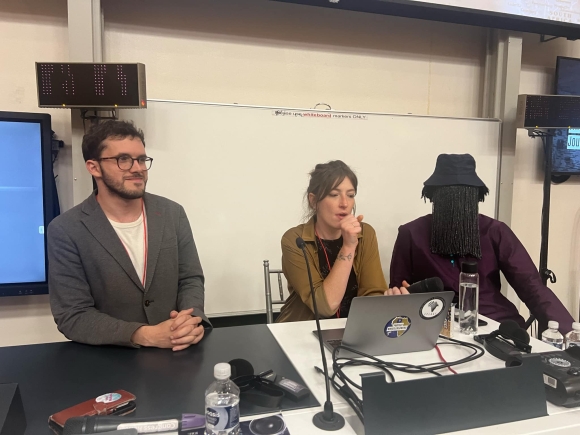The 20th African Investigative Journalism Conference (AIJC) in Johannesburg, South Africa, recently celebrated the work of Anas Aremeyaw Anas and Gabriel Bourdon-Fattal for their pivotal role in establishing a secure sanctuary for journalists and whistleblowers facing threats in Africa.
At the three-day event, investigative journalists and representatives of international organisations highlighted the positive impact of the Whistleblowers and Journalists Safety International Centre (WAJSIC) and the Platform to Protect Whistleblowers in Africa (PPLAAF) in providing refuge and legal support for those at risk.
Over recent years, both WAJSIC and PPLAAF have become lifelines for journalists and whistleblowers across Africa, especially in volatile regions like the Sahel.
Funded by the European Union and the German development agency GIZ, WAJSIC serves as a sanctuary for those who face persecution for exposing corruption, injustice, and abuse of power.
Meanwhile, PPLAAF offers essential support for whistleblowers, including strategic litigation and advocacy, enabling them to disclose vital information in the public interest under even the most challenging circumstances.
During a session focused on whistleblowers’ role in investigative journalism, Anas reflected on the vital and often perilous connection between journalists and whistleblowers.
“Few people are brave enough to stand as whistleblowers, facing ostracization and real dangers,” he noted.
He underscored the responsibility journalists have in safeguarding their sources’ identities, as whistleblowers often endure double the risks journalists face.
“They come to us as their last hope,” he said, stressing the need to handle their disclosures with care and caution.
Gabriel Bourdon-Fattal and PPLAAF’s Regional Project Officer, Gemma-Maé Hartley, highlighted the serious consequences that whistleblowers frequently endure for revealing “opaque acts of corruption, abuse of power, or public health threats.” These include job loss, blacklisting, death threats, exile, and even assassination.
They urged journalists to recognise the complex legal protections available to whistleblowers and to use secure communication methods when interacting with sources.
The importance of WAJSIC and PPLAAF’s work resonated deeply with attendees, including Namibian student journalist Bella Shilongo, who expressed a renewed sense of safety and purpose: “Knowing there is protection not just for me but for my sources and whistleblowers encourages me to pursue journalism wholeheartedly.”
Jennifer Ambolley from The Ghanaian Chronicle shared a similar sentiment, feeling newly empowered to pursue previously withheld stories.
Philip Paye of Liberia acknowledged the impact of these organisations but voiced concerns over their sustainability, hoping they wouldn’t become “a 9-day wonder.”
A Malian journalist, who withheld his identity for security reasons, praised WAJSIC and PPLAAF’s initiatives, citing the severe repression journalists face in Mali.
“In Mali, where many journalists endure threats from Russian trolls and government propagandists, having a refuge like WAJSIC could mean the difference between survival and silence,” he said.
Anas Aremeyaw Anas and Bourdon-Fattal’s work has set a remarkable precedent for media freedom and whistleblower protection across Africa.
With the support of international partners and advocates, WAJSIC and PPLAAF are proving instrumental in upholding the rights of those who risk everything to reveal the truth and protect public interest.
- Read also:
- Hardcore evidence is key to investigative journalism — Anas tells African investigative journalists
- Don’t be afraid to die - Edward Adeti addresses AIJC colleagues in South Africa
- Ugandan journalist Blanshe Musinguzi is Africa’s best investigative journalist in 2024
- Edward Adeti wins Journalist of the Year

